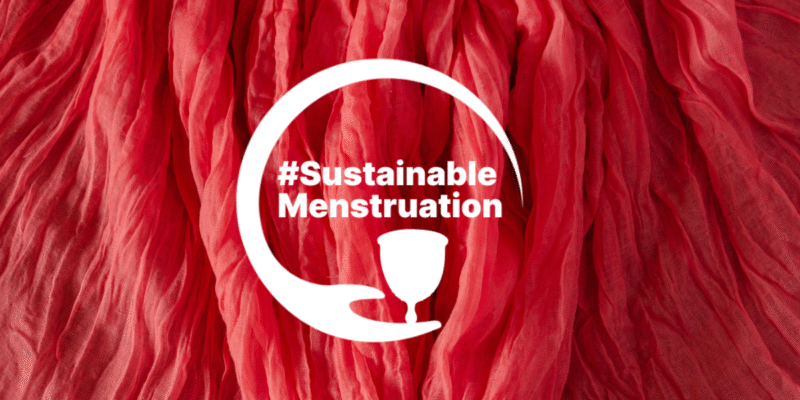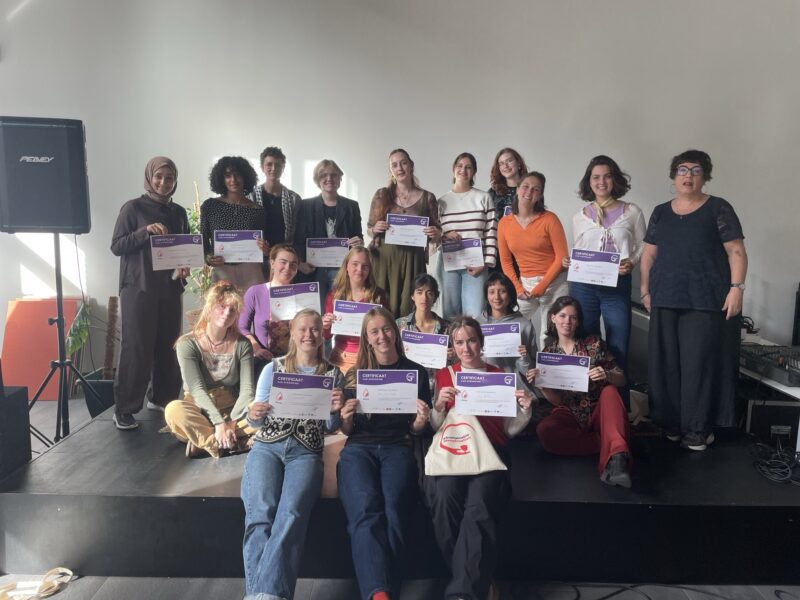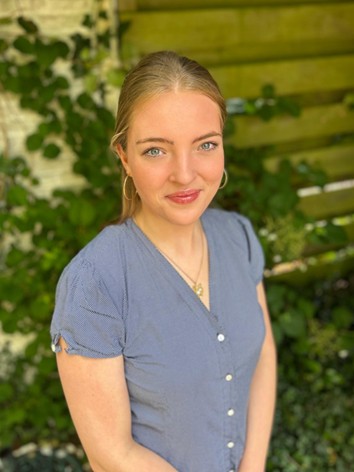
– BY HANNELORE COPPENS –
As an 18-year-old, you know surprisingly little about menstruation and even less about the sustainable aspect of it. Yet in our lifetime, we use on average more than 11,000 kilos of disposable products. These products end up in landfills, with a major impact on both the environment and our bodies. And so, on September 12, I found myself in Amsterdam (NL), attending a training by MENSY (Menstruation Empowerment Sustainability). Together with a group of young changemakers who, like me, want to make a difference.

Recognition & acknowledgment
The training started calmly: chairs lined up, a projector with a presentation, and a cup of tea next to your seat. But then came the first assignment: what does menstruation look like? One person shared about her Christian school, where the genital parts in biology books had been scribbled out. Another told about her experience with the pill, hormones, and a completely irregular cycle. Stories about rashes, eating patterns, PMS, PCOS, and endometriosis all came up. That’s where people found recognition and acknowledgment. It was really comforting to talk about it together.
And then I thought back: we hardly got any education about periods at school either. Isn’t that strange? Half the class menstruates! Luckily, I had my family, who taught me the basics through sharing experiences, books, and the Dutch tv-show Doctor Corrie. But imagine if I hadn’t had them?
A green red thread
What I didn’t know: menstruation and sustainability are deeply connected. We learned about:
- Body burden: how many harmful substances you unknowingly absorb through disposable products.
- Period poverty: girls staying home from school because they can’t afford menstrual products.
- Environmental impact: millions of kilos of waste worldwide.
- Limited scientific research on women’s bodies: pretty bizarre, isn’t it?
During the training, questions came up like: why isn’t there an ingredients list on menstrual product packaging? How can we switch to more sustainable period products in a single-use economy? Why do we act as if ‘that red stuff ‘ is dirty instead of just… natural?

Train the trainer
After the theory, we got hands-on. In groups of three, we were given a chapter from the MENSY manual and asked to turn it into a mini-training. The idea: to learn how to pass on this knowledge ourselves. A kind of ‘train-the-trainer’ session.
My group’s topic was: “Am I supposed to feel like this?” Our goal: prepare grade 6 students for what to do when they experience menstrual symptoms: talk about it, see a doctor if it doesn’t feel right, don’t hide it. We designed interactive games: raise your hand for symptoms that really need a doctor’s visit; a short, funny sketch about whether to go to your mom or to the GP.
Other groups were super creative, too. One let us play ‘shop’ with period products and a limited budget. Another did a taboo Q&A, where we, as the audience, shared personal experiences.
What about the boys?
During the debrief, we discussed the kinds of questions you’ll face as a trainer:
- At what age do you start teaching about this topic?
- How do you keep the energy up and everyone engaged?
- How do you stay ‘period positive’?
- And of course, the big one: what about the boys?
Menstruation is often seen as a girls-only topic, but actually, everyone should know how it works. After all, it’s part of human reproduction; doesn’t that concern everyone? By including boys and non-menstruators, we build understanding. The earlier this happens, the safer and more normal it becomes to talk about menstruation. These discussions felt lighthearted, yet serious. You learn that as a trainer, you’re not the expert, but the facilitator: someone who creates an open and safe space.
The feeling of womanhood
What moved me most was the feeling of womanhood. For the first time in a long while, I felt truly connected with a group of girls. No shame, no taboos, just recognition, support, and strength. I spoke with activists who had to leave their countries because they didn’t feel safe as women. And simultaneously, we here in the Netherlands were discussing period shame, the period tax, and the 24/7 cycle we’re expected to keep up with, as if our bodies never change.
Honestly, I’ve often thought: being a woman kind of sucks. Period pain, hassle, limitations. But that day gave me a new perspective: there’s power in it too. In understanding each other, supporting each other, and breaking taboos together.
What did I take away?
Afterwards, I asked myself:
- Do I feel more comfortable with my period? Yes.
- Do I care more about sustainable choices, am I an ecofeminist? Absolutely.
- Will I become a trainer myself? Not yet, but definitely in the future.
From now on, I’ll talk more openly about menstruation and sustainability with people of all ages and genders. And that’s exactly the power of MENSY. You don’t have to be an activist or a trainer. Just talking about it already makes a difference.
 About the author
About the author
Hannelore Coppens (18) finished high school in Oegstgeest (NL) with the International Baccalaureate diploma. After ten years in Budapest, Montreal, and Singapore, where she lived with her parents and two younger brothers, she’s now taking a gap year. She’s working as a ski instructor and volunteering as an English teacher, hoping to share her enthusiasm and experiences while learning about new cultures.
The MENSY project is a consortium of eight international organizations active in feminist and/or environmental fields, including WECF (Women Engage for a Common Future) in the Netherlands, and is funded through the Erasmus+ program. Want to become a MENSY ambassador as well? The next opportunity to follow a training is on October 21 in London (UK) and is initiated by WEN.
Period! is an independent, online magazine about all aspects of menstruation, created by Period Media. Period! is not intended as a substitute for medical advice. If you’re suffering from medical complaints, always visit your doctor or GP. Editorial articles can contain affiliate links. Sponsored collaborations can be found in the category Spotlight. Do you have any questions? Check our contact page.






